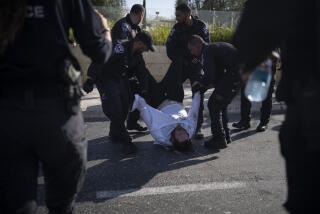The torture rule book
- Share via
IN 2003, the president of Israel’s Supreme Court, Aharon Barak, met with the justices of William Rehnquist’s Supreme Court in Washington. Barak reportedly warned the justices that unless they asserted themselves to define the measures the U.S. government could take in fighting terrorism, “history will judge you harshly.”
Justice Barak’s bold warning signaled a new, ironic role reversal for Israel. After years of being treated internationally as a human rights pariah and slammed annually in the State Department’s human rights report for its abuse of Palestinian detainees, Israel has suddenly become a model in the eyes of many American jurists and politicians.
Sen. John McCain (R-Ariz.) has repeatedly mentioned Barak’s 1999 ruling, which explicitly banned torture during interrogation of terrorism suspects, as an inspiration for his own measure outlawing torture. The legislation passed 90 to 9 in the Senate last month, but its fate in an upcoming House-Senate conference committee remains unclear.
The Israeli court’s landmark ruling is the benchmark for that country’s interrogators, who must now rely on psychological techniques alone to get information. Many in the General Security Service -- Israel’s equivalent of the FBI -- would have liked to continue using physical interrogation. Some in Israel’s security and political establishment say that the strict judicial limitations hinder the GSS’ effectiveness. But most have come to agree with Barak’s judgment that “a democracy must sometimes fight with one hand tied behind its back.” McCain said he had been convinced by Israelis that the rules had not crippled their anti-terrorism efforts.
The 23-page 1999 ruling requires Israeli interrogators to use only the methods on terrorism suspects that police are permitted to use on ordinary suspects: “The asking of questions that seek to elicit truthful answers.”
Rather than defining torture, the ruling forbade the use of physical means in interrogation and banned “borderline” methods that Israeli interrogators once routinely used: forcing a suspect to crouch on the tips of his toes, playing loud music and using hoods that cover a detainee’s entire head, even if it is ventilated to allow breathing. The ruling also banned sleep deprivation for the purpose of “breaking” a suspect.
The ruling was the culmination of a long, wrenching process for Israeli society in which Israeli authorities and the public came to disavow torture. It began in 1984 when, after years of ignoring complaints by Palestinians about torture and abuse, a national commission of inquiry was formed following the killing of a Palestinian terrorist by GSS interrogators, who then lied about the death. The commission’s report, submitted in 1987, sanctioned the use of physical duress, explaining that sometimes -- after psychological methods have been exhausted -- “a moderate measure of physical pressure cannot be avoided” when interrogating a terrorism suspect who is believed to have knowledge of an imminent danger to the public. Only in such “ticking time bomb” scenarios were interrogators permitted to shake a detainee’s upper torso.
Shortly after the report was published, the first Palestinian uprising erupted and thousands were detained and interrogated. Mounting complaints of abuse indicated that GSS interrogators were using the disallowed methods and abusing the flexibility granted them under the “ticking time bomb” exemption. One detainee was shaken to death, and many others -- some of them political activists who were released without charges -- appealed their treatment to the Supreme Court. Barak and his colleagues examined the legality of each of the techniques routinely used by the GSS and banned them, including in “ticking bomb” situations.
However, the ruling does leave some wiggle room in such situations by allowing a GSS officer accused of using an illegal method during an urgent interrogation to assert a “necessity defense” on the grounds of national security, which the court may allow or reject depending on the circumstances.
U.S. legal scholars have recently praised the practical activism of Israel’s Supreme Court for defining the balance between legitimate national security considerations and equally legitimate civil rights -- and for doing so in a time of war. The Pentagon is also seeking Israeli expertise in educating soldiers on how to respect human rights while fighting terrorists in a civilian environment.
As the U.S. faces damning criticism for alleged cases of torture, the U.S. Supreme Court has a chance to reevaluate its reluctance to place limits on the powers of the executive branch in wartime and the resistance of some justices to learning from foreign legal systems. If it fails to act on the grounds of avoiding judicial activism, Barak’s warning could haunt the court for years to come.
More to Read
Sign up for Essential California
The most important California stories and recommendations in your inbox every morning.
You may occasionally receive promotional content from the Los Angeles Times.










